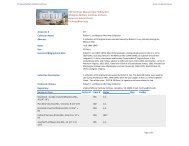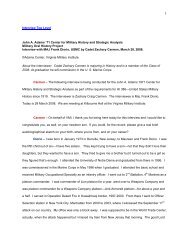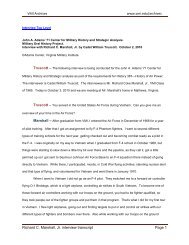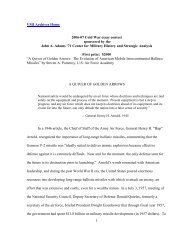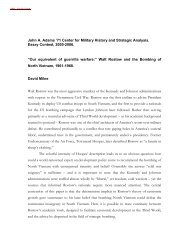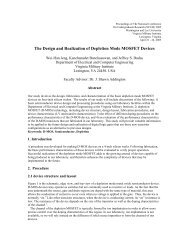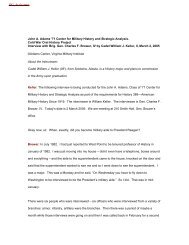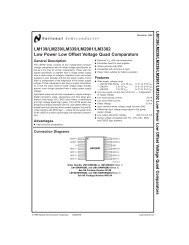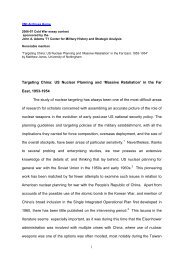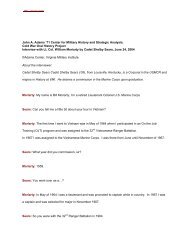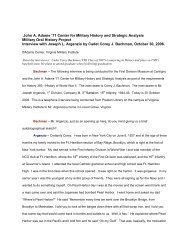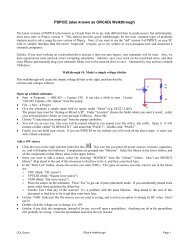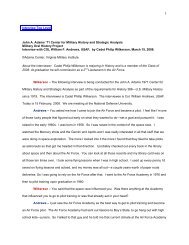Academic Catalog - Virginia Military Institute Admissions
Academic Catalog - Virginia Military Institute Admissions
Academic Catalog - Virginia Military Institute Admissions
You also want an ePaper? Increase the reach of your titles
YUMPU automatically turns print PDFs into web optimized ePapers that Google loves.
<strong>Virginia</strong> <strong>Military</strong> <strong>Institute</strong><br />
Aerospace studies<br />
DEPARTMENT OF AEROSPACE STUDIES<br />
DEPARTMENT HEAD: ColONEl LEE<br />
Curriculum is delivered in accordance with applicable service regulation and<br />
instruction.<br />
AS 103 and AS 104. THE AIR FORCE TODAY<br />
1 credit<br />
Introduces students to the USAF and AFROTC. Topics include: mission and organization,<br />
Air Force heritage, officership and professionalism, military customs and courtesies, Air<br />
Force officer opportunities, and communication skills.<br />
AS 203 and AS 204. THE EVOLUTION OF USAF AIR AND SPACE POWER<br />
1 credit<br />
Examines air and space power through a historical perspective in addition to fundamental<br />
truths associated with war in the third dimension. Additionally, cadets will continue to learn<br />
Air Force core values and communication skills.<br />
AS 213 and AS 214. AIR FORCE LAB FOR AS 203 and 204<br />
0 credits<br />
Prepares cadets pursuing an Air Force commission for AFROTC Summer Field Training.<br />
AS 303 and AS 304. AIR FORCE LEADERSHIP AND MANAGEMENT<br />
2 credits<br />
Emphasizes the concepts and skills required by the successful manager and leader. Includes<br />
individual motivational and behavioral processes, leadership, communication, and group<br />
dynamics, which provide the foundation for developing the junior officer’s professional and<br />
officership skills. The fundamentals of management, emphasizing decision making, the use of<br />
analytic aids in planning, organizing, and controlling in a changing environment are included.<br />
Organizational and personal values (ethics), management of change, organizational power,<br />
politics, and managerial strategy and tactics are discussed within the context of the military<br />
organization. These courses must be taken with appropriate leadership laboratories.<br />
AS 313 and AS 314. LEADERSHIP LAB FOR AS 303 and AS 304<br />
0 credits<br />
Leadership laboratory activities include experiences in officer-type activities. <strong>Military</strong> briefings<br />
and Air Force case studies are used to help students apply the leadership and management<br />
principles of this course. (Cadets who are not seeking a commission must attend LS 350<br />
and LS 351.) These labs must be taken concurrently with the appropriate lecture course.<br />
These courses must be taken with appropriate leadership laboratories.<br />
AS 403 and AS 404. NATIONAL SECURITY AFFAIRS AND<br />
PREPARATION FOR ACTIVE DUTY<br />
2 credits<br />
Examines the formulation, organization, and implementation of national security policy;<br />
evolution of strategy; management of conflict; and civil-military interaction. Includes blocks<br />
of instruction on the military profession, officership, and the military justice system. Provides<br />
future Air Force officers with a background of United States National Security Policy so they<br />
can effectively function in today’s Air Force. These courses must be taken with appropriate<br />
leadership laboratories.<br />
AS 413 and AS 414. LEADERSHIP LAB FOR AS 403 and AS 404<br />
0 credits<br />
Leadership laboratory activities include advanced leadership experiences in officer-type<br />
activities and orientation for initial active duty. (Cadets who are not seeking a commission<br />
must attend LS 450 and LS 451.) These labs must be taken concurrently with the appropriate<br />
lecture course.<br />
arabic<br />
DEPARTMENT OF MODERN LANGUAGES AND CULTURES<br />
Department Head: Colonel Bulger-Barnett<br />
1. All cadets who enter with two or more entrance units in a modern foreign language<br />
are given placement tests and are placed in appropriate courses on the basis of the test<br />
results, their previous high school language coursework, and after consultation with the<br />
department head of modern languages.<br />
2. A single year of a foreign language shall count toward meeting graduation requirements<br />
only when the cadet is studying a second language or is taking a language as an elective.<br />
3. Classroom work is supplemented with computer-aided language instruction in a wellequipped<br />
Language Learning Center.<br />
Prerequisites: Cadets must demonstrate proficiency in ML 101 in order to be admitted into<br />
ML 102. They must, similarly, demonstrate proficiency in ML 102 before enrolling in ML 201,<br />
and in ML 201 before enrolling in ML 202/204. Proficiency in ML 202/204 is a prerequisite for<br />
admission to 300-level courses. Completion of two 300-level courses or their equivalent is<br />
expected before enrollment in any 400 -level course. Once a cadet has completed work at<br />
the 202/204 level, he/she may not return to the elementary level course for credit.<br />
Cadets who present three or more years of a high school language or demonstrate native<br />
or near-native language abilities may not enroll at the elementary level of that language. Such<br />
students will have the choice of enrolling either in the first semester intermediate level of that<br />
language or in the first semester elementary course of a different language.<br />
AR 101. ELEMENTARY ARABIC I 3—0—3<br />
An introduction to the fundamentals of Arabic. Primary emphasis on the acquisition of<br />
12-13 <strong>Catalog</strong>ue<br />
basic language skills (comprehending, speaking, reading, and writing) within the context<br />
of culture and civilizations. Secondary emphasis on the cultures where Arabic is spoken.<br />
Intended for beginners with no previous experience in the language.<br />
AR 102. ELEMENTARY ARABIC II 3—0—3<br />
A continuation of AR 101. Prerequisite: AR 101.<br />
AR 201. INTERMEDIATE ARABIC 3—0—3<br />
A continuation and systematic review of structural principles and an introduction to the<br />
reading and discussion of cultural materials and texts with the aim of improving the four<br />
basic language skills. Conducted as much as possible in Arabic. Prerequisite AR 102.<br />
AR 202. INTERMEDIATE ARABIC 3—0—3<br />
A continuation of AR 201 with emphasis on writing. This course is intended to consolidate the<br />
basic language skills and to prepare the student for advanced work in Arabic. Conducted as<br />
much as possible in Arabic. Readings based on civilization and culture. Prerequisite: AR 201.<br />
AR 301W. ARABIC COMPOSITION AND CONVERSATION 3—0—3<br />
Designed to improve students’ spoken and written command of Arabic. Discussions, oral<br />
reports, and writing assignments include topics in Arabic civilizations and cultural history.<br />
Conducted mainly in Arabic. Prerequisite AR 202.<br />
AR 302W. ARABIC COMPOSITION AND CONVERSATION 3—0—3<br />
A continuation of AR 301W. Prerequisite: AR 301W.<br />
AR 314. ARABIC CIVILIZATIONS AND CULTURES 3—0—3<br />
A survey of the history, literature, educational systems and values of the Arab Word. The<br />
course will be based on readings from contemporary sources: Short stories, magazines,<br />
newspapers, literary works and legal documents. The course is designed to build on the<br />
reading and writing skills of AR 301 and AR 302. It is also intended to enhance cadets’<br />
cultural awareness of contemporary issues, which affect the Arabic speaking world and<br />
the United States. Prerequisite: AR 301, AR 302.<br />
AR 315. ARABIC FOR THE MEDIA 3—0—3<br />
Emphasizes written and aural comprehension of Arabic media (newspapers, journals,<br />
radio and television, news broadcasts, and documentaries). The goal is to introduce and<br />
consolidate lexical items which commonly occur in the media and in economic and scientific<br />
texts. The principal language of instruction is Arabic. Prerequisite: Two AR 300’s.<br />
AR 316. TOPICS IN ARABIC 3—0—3<br />
Information and discussion of diverse topics from the Arabic-speaking world. The principal<br />
language of instruction is Arabic. Prerequisite: Two AR 300’s. Retakes for credit.<br />
AR 405. INDEPENDENT READINGS 3—0—3<br />
Directed readings of major literary works. Conducted almost exclusively in Arabic.<br />
Prerequisite: Completion of at least 9 hours beyond AR 202 or permission of the instructor<br />
and department head. Retakes for credit.<br />
AR 407. ADVANCED ARABIC GRAMMAR AND SYNTAX 3—0—3<br />
A systematic study of Arabic grammar and syntax. Emphasis also on vocabulary development<br />
and study of idiomatic expression. Prerequisite: Two AR 300’s.<br />
AR 408. ARABIC LITERATURE OF THE 19 TH CENTURY 3—0—3<br />
A study of major movements and writers of the 19 th century with special emphasis on<br />
Romantic poetry and prose. Conducted in Arabic. Emphasis on developing reading and<br />
writing skills. A research paper is required. Prerequisite: Two AR 300’s.<br />
AR 409. ARABIC LITERATURE OF THE 20 TH CENTURY 3—0—3<br />
A study of major writers and poets of the 20 th century with special emphasis on Naguib<br />
Mahfouz’s Trilogy. A research paper is required. Prerequisite: Two AR 300’s.<br />
AR 410. ADVANCED ARABIC 3—0—3<br />
Aimed at cadet acquisition of proficiency in Modern Standard Arabic. Audiovisual materials<br />
and authentic Arabic Texts will be the main sources of study. Students will be exposed to<br />
and expected to master a wide range of different texts, including excerpts from the Qur’an,<br />
newspaper articles, classical poetry and prose, modern fiction, and essays. Prerequisite:<br />
Two AR 300s.<br />
AR 418. ARABIC FOR BUSINESS 3—0—3<br />
An introduction to Business Arabic. Includes a review of the grammar and syntax of the<br />
Arabic language. The study of Arabic texts relevant to business and management practices<br />
in different Arab counties will provide cadets with a general cultural background of Arabic<br />
countries. Prerequisite: Two AR 300’s.<br />
AR 420. ARABIC POETRY 3—0—3<br />
A survey of Arabic poetry from the advent of Islam to the present. Excerpts from the major<br />
works of prominent poets are studied for form and historical significance. Conducted in<br />
Arabic. Research paper required. Prerequisite: Two AR 300s.<br />
AR 450. MODERN LANGUAGE CAPSTONE COURSE 3—0—3<br />
The student will choose a topic incorporating an analysis of historical, literary or cultural<br />
78




